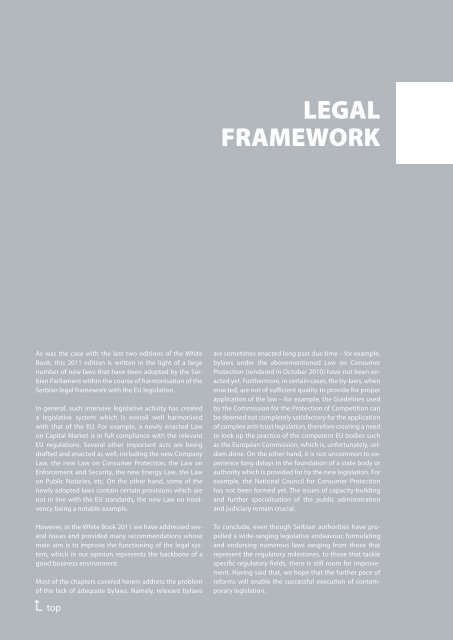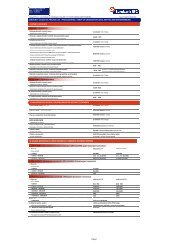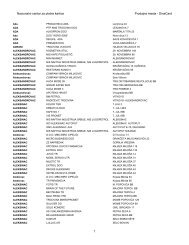Fic rEcommEndationS - Eurobank EFG
Fic rEcommEndationS - Eurobank EFG
Fic rEcommEndationS - Eurobank EFG
Create successful ePaper yourself
Turn your PDF publications into a flip-book with our unique Google optimized e-Paper software.
As was the case with the last two editions of the White<br />
Book, this 2011 edition is written in the light of a large<br />
number of new laws that have been adopted by the Serbian<br />
Parliament within the course of harmonisation of the<br />
Serbian legal framework with the EU legislation.<br />
In general, such intensive legislative activity has created<br />
a legislative system which is overall well harmonised<br />
with that of the EU. For example, a newly enacted Law<br />
on Capital Market is in full compliance with the relevant<br />
EU regulations. Several other important acts are being<br />
drafted and enacted as well, including the new Company<br />
Law, the new Law on Consumer Protection, the Law on<br />
Enforcement and Security, the new Energy Law, the Law<br />
on Public Notaries, etc. On the other hand, some of the<br />
newly adopted laws contain certain provisions which are<br />
not in line with the EU standards, the new Law on Insolvency<br />
being a notable example.<br />
However, in the White Book 2011 we have addressed several<br />
issues and provided many recommendations whose<br />
main aim is to improve the functioning of the legal system,<br />
which in our opinion represents the backbone of a<br />
good business environment.<br />
Most of the chapters covered herein address the problem<br />
of the lack of adequate bylaws. Namely, relevant bylaws<br />
� top<br />
LEGAL<br />
FRAMEWORK<br />
FRAMEWORK<br />
are sometimes enacted long past due time – for example,<br />
bylaws under the abovementioned Law on Consumer<br />
Protection (rendered in October 2010) have not been enacted<br />
yet. Furthermore, in certain cases, the by-laws, when<br />
enacted, are not of sufficient quality to provide for proper<br />
application of the law – for example, the Guidelines used<br />
by the Commission for the Protection of Competition can<br />
be deemed not completely satisfactory for the application<br />
of complex anti-trust legislation, therefore creating a need<br />
to look up the practice of the competent EU bodies such<br />
as the European Commission, which is, unfortunately, seldom<br />
done. On the other hand, it is not uncommon to experience<br />
long delays in the foundation of a state body or<br />
authority which is provided for by the new legislation. For<br />
example, the National Council for Consumer Protection<br />
has not been formed yet. The issues of capacity-building<br />
and further specialisation of the public administration<br />
and judiciary remain crucial.<br />
To conclude, even though Serbian authorities have propelled<br />
a wide-ranging legislative endeavour, formulating<br />
and endorsing numerous laws ranging from those that<br />
represent the regulatory milestones, to those that tackle<br />
specific regulatory fields, there is still room for improvement.<br />
Having said that, we hope that the further pace of<br />
reforms will enable the successful execution of contemporary<br />
legislation.




